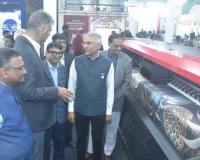Surat : Textile Traders Express Frustration Over 65-Kilogram Weight Limit on Parcels Amidst Market Resurgence

Surat – Over the past few days, the Surat textile market has been abuzz with discussions surrounding new restrictions on parcel weights. A directive issued under the banner of the Transport Association, and supported by various trade organizations, has advised that parcels exceeding 65 kilograms will no longer be accepted for transportation. This sudden imposition has left many traders feeling bewildered and disillusioned.
The timing of these directives has particularly irked traders, who question why such restrictions are only enforced when the market begins to pick up momentum. "Why is it that these bodies wake up only when business is thriving? During slower periods, they remain as silent as a snake in hibernation, only to hiss as soon as the market gains speed," one trader lamented. The general sentiment among the trading community is one of frustration, as these orders divert their attention from business to what they perceive as trivial matters.
The challenges faced by local traders are compounded by the fact that out-of-town buyers often dictate the choice of transporters. As Harvanshlal Arora, the head of the Surat Textile Market Association, pointed out, "The majority of parcels are under 65 kilograms. Occasionally, a parcel may exceed this limit, but out of 80 parcels, most will be within the accepted weight range." He added that over time, the industry will likely adjust to the new norm.
Pappu Chaparia, a leading figure in the Silk Plaza Market, echoed these sentiments, noting that parcels in Surat are rarely uniform in size. "Some are small, others are large. This market has become buyer-driven. If the buyer specifies a transporter, we have no choice but to comply," he explained. He further suggested that weight-based freight charges might be a more equitable solution and criticized the use of labor regulations as a pretext for these restrictions in an era dominated by machinery.
Kamleshbhai Jain of Millennium Market raised another critical issue, questioning the consistency of labor regulations across different regions. "In Surat, we receive parcels weighing between 125 and 150 kilograms from places like Bhiwandi, Malegaon, and Rajasthan's Balotra and Pali. Are the same labor rules not applicable there?" he asked. Jain urged trade organizations to assist in resolving traders' claims issues if they insist on enforcing the 65-kilogram limit. He advocated for the use of machinery for loading and unloading heavy parcels, rather than using laborers as a shield.
As the debate rages on, Surat's traders find themselves at a crossroads, unsure of whom to trust or how to navigate the new restrictions that have been imposed upon them. The lack of clear leadership and support has only deepened their sense of disillusionment, leaving them to wonder where their interests truly lie.






